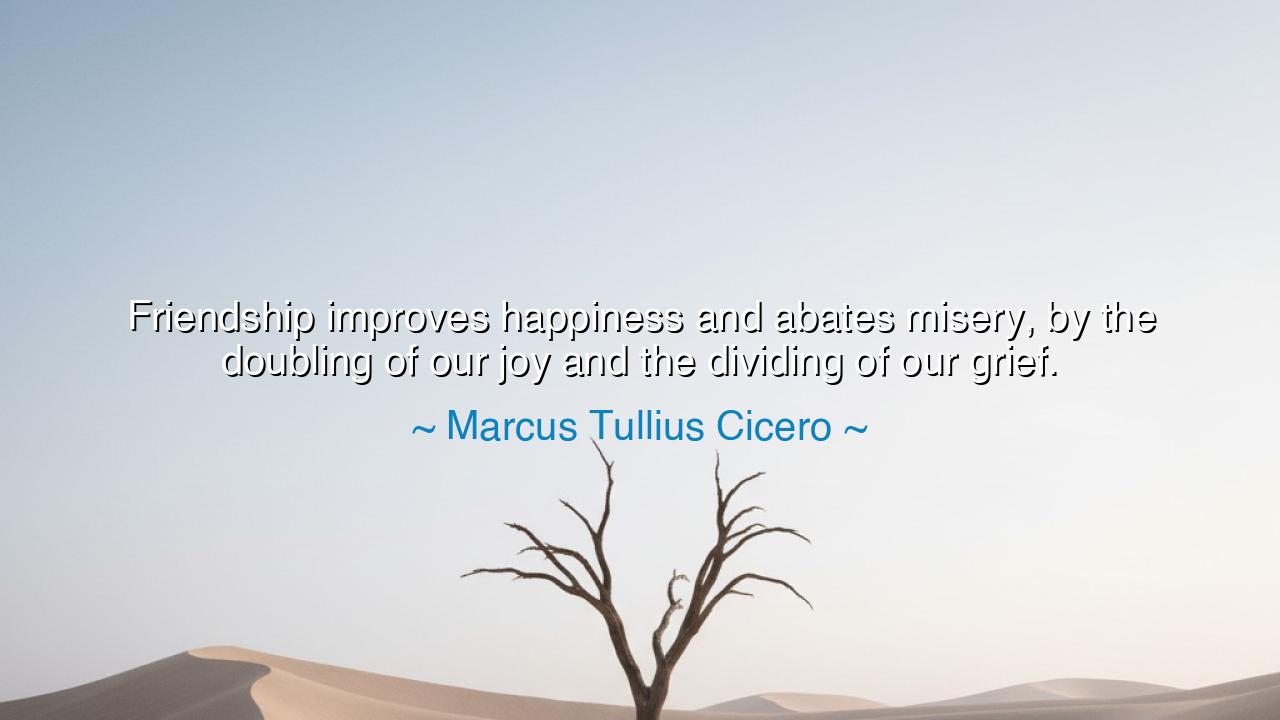
Friendship improves happiness and abates misery, by the doubling
Friendship improves happiness and abates misery, by the doubling of our joy and the dividing of our grief.






“Friendship improves happiness and abates misery, by the doubling of our joy and the dividing of our grief.”
Thus spoke Marcus Tullius Cicero, the great Roman orator, philosopher, and statesman—one who had known the heights of glory and the depths of exile. These words, drawn from his timeless work Laelius de Amicitia (On Friendship), are not the musings of a dreamer, but the wisdom of a man who had seen empires rise and crumble, who had stood at the side of friends both loyal and false, and who, in the twilight of his life, found in friendship the truest measure of human fortune. Cicero’s insight shines with eternal truth: that life’s happiness is magnified when shared, and its misery made bearable when borne by another’s heart.
The meaning of this quote reaches into the very essence of human nature. Alone, a man may climb mountains and conquer nations, yet the summit will feel barren if no friend stands beside him. In joy, friendship doubles happiness by turning delight into communion—by transforming what was inward and private into something shared, sung, and celebrated. Likewise, in sorrow, friendship divides grief, for a burden halved by love weighs less upon the soul. When Cicero speaks of this divine arithmetic of the heart, he reminds us that friendship is not an ornament to life—it is its sustenance. Without it, joy becomes vanity, and pain becomes despair.
In his time, Cicero was no stranger to the storms of fortune. His dearest friend, Titus Pomponius Atticus, was his confidant through years of political turmoil and exile. When Rome turned against him and he fled his homeland, it was Atticus who comforted him with letters, who sent him words of courage, and who refused to let despair consume him. Through Atticus’s friendship, Cicero’s grief was not erased, but abated; through that companionship, his sorrow was softened and his courage rekindled. Later, when Cicero returned to Rome and tasted success once more, it was that same friendship that turned triumph into something radiant. It was this living experience that shaped his immortal words—he had seen that joy shared was joy increased, and grief shared was grief diminished.
History is rich with such examples. Consider the tale of Jonathan and David in the ancient scriptures—two souls joined by a bond stronger than fear, ambition, or even death. When David triumphed over Goliath, his glory was not his alone; it was a joy that Jonathan, son of Saul, shared as his own. And when David’s life was hunted by the envy of kings, it was Jonathan’s loyalty that shielded him, his friendship that divided the anguish of exile and danger. In that sacred companionship, the joy of one became the joy of both, and the sorrow of one became the burden of both hearts together. Such love—selfless, steadfast, unshaken—reveals the truth Cicero spoke two millennia ago: that friendship is the greatest balm the gods have given mortal men.
But Cicero’s wisdom carries a warning too. He implies that friendship must be true to work this wonder. Not all companions can lighten grief or double joy; only those who love without envy, who listen without judgment, who give without asking. False friends magnify our miseries and poison our triumphs. True friendship, however, is born of virtue—a harmony of souls that seeks not gain, but goodness. It is a bond between hearts that see each other clearly, through both the light and the shadow, and remain unbroken. Cicero believed that only those who are good can truly be friends, for friendship, at its core, is a form of moral beauty.
If we listen closely to Cicero’s voice across the centuries, we hear more than philosophy—we hear longing. His Rome was a place of ambition and betrayal, of fleeting alliances and fragile trust. And yet, in the midst of this, he wrote of friendship as something eternal, something that transcends the tides of politics and the decay of power. For all the marble and grandeur of his age, Cicero knew that the greatest monument any man can build is not of stone, but of love shared between souls. Empires fall; friendship endures.
So, let us take his wisdom to heart, O seeker of truth. Cherish your friends—those rare souls who multiply your laughter and carry your pain. Be slow to anger with them, quick to forgive, and generous in understanding. Speak your gratitude while they yet walk beside you, for friendship neglected is a flower untended, and once wilted, it seldom blooms again. Share your happiness freely, that it may grow; share your sorrows honestly, that they may lessen. For in the end, when the fires of youth fade and the glories of the world turn to dust, it is friendship that will remain—the echo of laughter in dark places, the hand that steadies the trembling heart, the light that outlasts the years.
Thus, Cicero’s words stand immortal, a flame in the long night of history: “Friendship improves happiness and abates misery, by the doubling of our joy and the dividing of our grief.” Let those who hear them live accordingly—seeking not riches nor fame, but the sacred fellowship of true friends. For to find even one such soul in a lifetime is to hold a treasure greater than all the crowns of kings.






AAdministratorAdministrator
Welcome, honored guests. Please leave a comment, we will respond soon